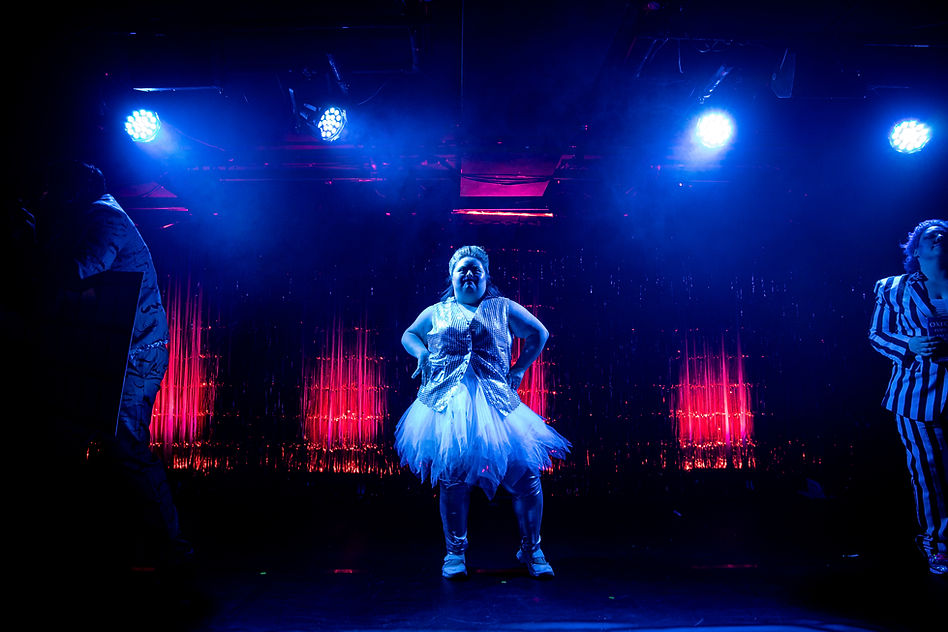

Award- winning Crip Queer Punk Cabaret-Theatre Not Your Circus Dog Collective!



Not Your Circus Dog Collective’s practice-based research focuses on three key areas, addressing ongoing systemic discrimination and exclusion of learning-disabled and autistic (LD and A) people from the performing arts:
-
inclusion through creative co-production and inclusive programming;
-
creating opportunities for learning-disabled artists as theatre makers, through training, mentoring and partnerships for casting;
-
promoting self-representation and self-advocacy for disabled people through policy and curriculum contributions that reach beyond national and disciplinary boundaries.
This work has been delivered through partnerships with the disability arts organisation Access All Areas (AAA) and commissions and productions at theatres including Soho Theatre, The Royal Court, and the South Bank Centre.

Underpinning research
Everyone in NYCD identifies either / and as learning-disabled, / neuro divergent. The creative process foregrounds their identification, disrupting
theatrical norms through a radical Crip, queer, collaborative and feminist approach across her solo work, mentoring, consultancy, teaching,
writing and directing.
Practice-based research in the form of theatre- making complemented by writing, grounded in the ethic of care and collaboration, to bring the lived experience of disabled artists to the centre. These innovations led to new training pedagogies and creative opportunities for emancipatory self-representation. The research was conducted in partnership with disabled artists, co-constructing radically political questions about continued exclusion and discriminatory assumptions around binaries of ‘ability/disability’.
NYCD’s work is driven by a central research enquiry framed by the following questions:
1. How can Crip and queer performance create an accessible aesthetic to engage
the wider public / audiences in active considerations of their own lives?
2. How can theatre-making processes be deployed to enable, include,
champion, and celebrate neuro-diverse and learning-disabled artists as equals and as leaders in the industry and in training?
3. How can Crip theatre implicate audiences in challenging ongoing
discrimination experienced by learning-disabled people?
Through close engagement with Emancipatory Disability Research and the Political-Relational Model of disability (Kafer 2013), Terret PaR foregrounds learning disability or Crip aesthetics and re-affirms the performer as creator and leader in authoring performance. The politics of disability arts lies at the heart of the practice-as-research: the practice is about visibility of agency and understanding the systems that reinforce discrimination.
The primary work constituting this research includes co-created theatre productions, articles and chapters, reports for the industry, training, consultation, national and international presentations, with key partnerships and collaborations with the Disability Arts organisation Access All Areas, The British Council and The Live Art Development Agency.
A core company of artists (Not Your Circus Dog Collective), directed by Terret, developed through iterative process Not F**kin’ Sorry! , a punk Crip queer theatre production drawing on the company’s lived experiences of disability discrimination. Bringing artists whose work usually falls outside dominant cultural markets to high profile stages (The Royal Court, Soho Theatre, South Bank Centre), challenges venues and audiences in their understanding of whose stories are told, and on which stages they are permitted.
This work demonstrates the potential of University research applied to the field of professional performing arts with radical activist intent. The methods and practices in performance forms resonates nationally and internationally through
collaborations across the sector.

Selected References
Selwyn, E. and Terret, L. 2019. Defiant bodies: a punk rock Crip queer cabaret: cripping and queering emancipatory disability research, in Duffy, P., Hatton, C., Sallis, R. (eds.) Drama Research Methods Series: Provocations of Practice, Bold Visions in Educational Research, 161-180. Co-authored with Selwyn, E. an autistic actor and member of Not Your Circus Dog.
https://doi.org/10.1163/9789004389571_010
Terret, L. 2018. An Overview of Performing Arts as They Relate to Disability in the United Kingdom in Castaño, A. (ed.) Jornadas sobre la Inclusión Social y la Educación en las Artes Escénicas (2009-2018) El Instituto Nacional de las Artes Escénicas y de la Música (INAEM). pp. 251-259
Terret, L. 2016. Repositioning the Learning-Disabled performing arts student
as critical facilitation, in Preston, S. (ed.) Applied theatre: facilitation pedagogies, practices, resilience Methuen Drama. 131-
150 https://doi.org/10.5040/9781472576965.ch-006
Mackey, S. & Terret, L. (2015) Move Over, There's Room Enough: Performance Making Diploma: training for learning disabled adults in Research in Drama Education: The Journal of Applied Theatre and Performance (Volume 20, Issue 4), Taylor & Francis (Google Scholar 4 citations)
Terret, L. (2009) ‘Who’s Got The Power? Performance and Self Advocacy for People with Learning Disabilities’ in The Applied Theatre Reader. Preston, S & Prenkti T (Eds.), Routledge
Not F**kin’ Sorry! (2016- ongoing). Performed in 2016 at venues including: The Royal Vauxhall Tavern, R&D at Soho Theatre and The Electric, Brixton. The work continued in 2018 through commissions by Women of the World 2018 (WoW, Southbank Centre, and The Royal Court Theatre. In 2018 an additional ACE National Lottery Project Grant furthered the work with a commission for Soho Theatre, Terret led a new devising and development process for Not Your Circus Dog and delivered a sold-out run.